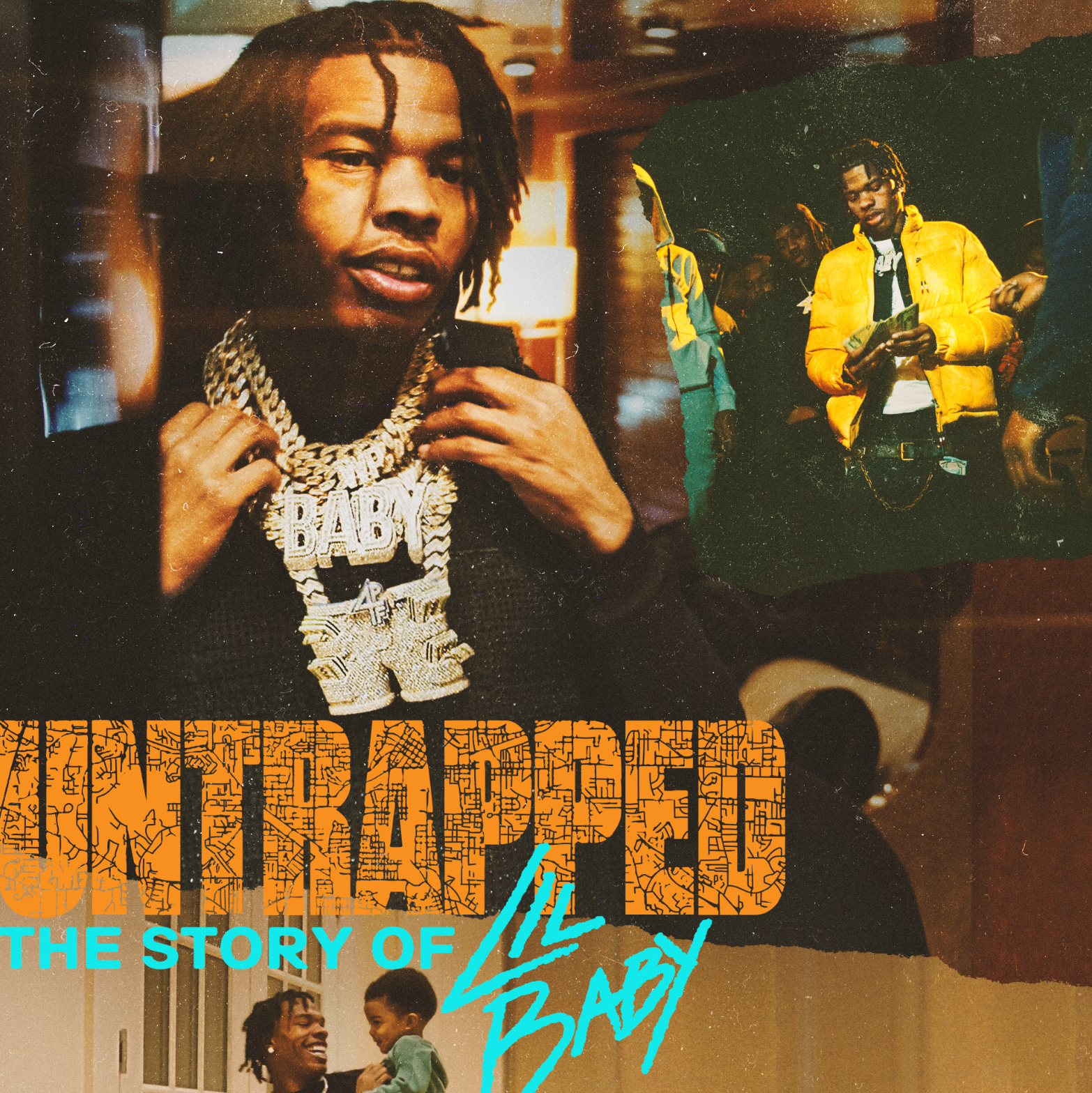
★★★☆☆
It’s 1996, and Atlanta’s projects are hit by the juggernaut of the Olympics. Having won the bid, the city was subject to a huge transformation – enabled by the elite and maintained through the state. The aim was to create an Atlanta for the world to receive at the grievance of an already disenfranchised poor populace this “development” would displace. Projects were destroyed and Olympic stadiums and buildings were raised; communities forcefully dispersed to accommodate temporary Olympic personnel.
It’s such context provided by historian Maurice Hobson at the beginning of the documentary, Untrapped: The Story of Lil Baby, that sets the scene for an intriguing watch I didn’t entirely expect. Connecting a systematic weight of the state to one of the most successful rappers of this era, investigating the devices that fanned his flames to fruition, and landing in today where Lil Baby has cemented a prominent place in the scene and world of music. Untrapped spans the career and life of Dominique Jones, guiding you through a chequered journey of the rapper’s career .
It looks at his family life, how a home composed of two older sisters and a single mother was burdened by an absent father, and the pressures of Oakland City. It also strongly contrasts his family life as a child with his own, showing him a father invested in the upbringing and socialisation of his children. (It must be said, Jason, the rapper’s first-born steals the show). The doc goes on to detail how Dominqiue and youths from similar areas were forced to act beyond their years, hence his name, finding himself surrounded by peers ten years older than him.
It relays a young Dominique’s genius, how he mastered numbers and was generally bright, but succumbed to a life led by a lack of money and the impression of how to get it through the streets. Skiving school, Dominique spent days on end in the streets trying to make money. Dealing, playing Cee-lo, a 6 dice probability game, and hustling to earn a living, he became an unfortunate breadwinner, but also managed to retain a respect for being a genuine hustler everyone revered.
Untrapped is a fitting name, as such a journey elicits behaviours those with a “proper” environment can avoid. But it is stressed as a norm in such areas, not just in Atlanta but worldwide in disenfranchised areas. A life of crime, oppression by the state, brutality at the hands of the police, and death by shape of a distraught road supposedly leading you to success. This was the reality of Lil Baby’s upbringing, born into a poverty that in Atlanta, as Maurice states, statistically there is a high probability you will be in poverty for the rest of your life.
Coming from a situation of absolute poverty, Lil Baby was always invested in making and maintaining money. Coach K, one of the two founders of Quality Control (the label Lil Baby and many successful artists are signed to), gave the perspective of the poverty stricken – how even leaving the neighbourhood was hard and unaffordable. People don’t have money to travel, explore life and see different things. Hence the success they saw sparkling in front of their immediate eyes were the drug dealers, the hustlers, through a life of crime.
Breaking away from the attachment to such a lifestyle was Lil Baby’s challenge. Having listened to Lil Baby since a tremendous debut and run, I found myself joining the wave of his fandom. He had landed.


Untrapped: The Story of Lil Baby poster, courtesy of IMDB.
Fans are also familiar with Young Thug as an encouraging force in dropping the streets for an attempt at a career, but Untrapped expands on the harshness of the transition and the effort it requires. It’s inspirational to see someone come from nothing, and become a top rapper.
From enunciation to performance on the stage, through the topics and true tales he injects into his bars, Untrapped is starred with a collection of ideas amounted from those who cherish Baby’s upcoming, including Thug, Gunna, P, Drake, Rolling Stone Staff Writer Charles Holmes, and the CEO of Motown Records, Ethiopia Habtemariam.
What I loved about this documentary were the small moments that built up the charisma of Lil Baby. The man is hilarious, whether by his reactions to things that occur or his genuine takes on situations. He is also very endearing, caring for those he sees as coming from a similar situation to his own.
The most notable moments for Lil Baby feel full circle, evident as life has evolved for him since being married to the street life of Atlanta, where his feet are still grounded in an understanding of the livelihoods back home and a realisation of his own. There’s a particularly interesting moment where he speaks on his Grammy snub; where, despite his meteoric rise and having the best-selling album of 2020 in all genres, he didn’t receive a nomination.

Coinciding with the pandemic, Lil Baby’s peak was arguably not witnessed by the world. It was in this time he turned inward, evaluating himself and looking for that bigger picture. In the same year Lil Baby released a song named exactly that – ‘The Bigger Picture’ – a song hailed as a protest, that sat alongside a shaking world after the death of George Floyd, and yet it merely sings volumes for Lil Baby’s life and experiences.
Given Lil Baby is by no means at the end of his career, and this documentary therefore doesn’t chart a major historical artist (just yet), nor is it the most innovative spectacle, it’s some way from getting a full marks review.
Nonetheless, through a collation of interviews and old school footage, it really leaves an imprint on who Lil Baby is, and also ties together concepts of family, the reality of the state, housing, poverty, ambition, money and the art of rapping. You’ll end watching this fascinating documentary with a lot of respect for Lil Baby – and learn much more about representation in the process.
‘Untrapped: The Story of Lil Baby’ is available to stream from today on Amazon Prime Video.




